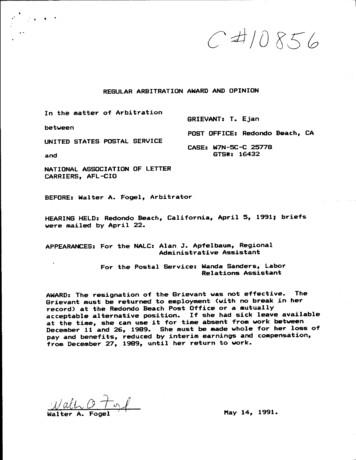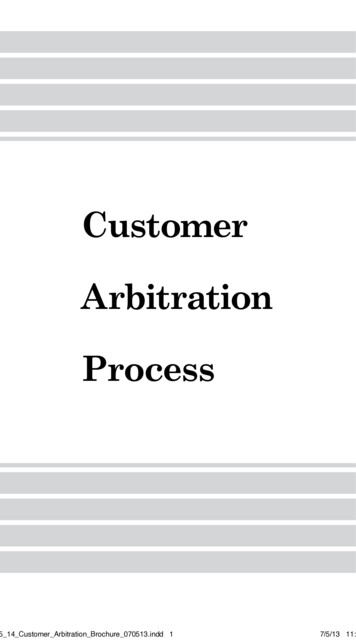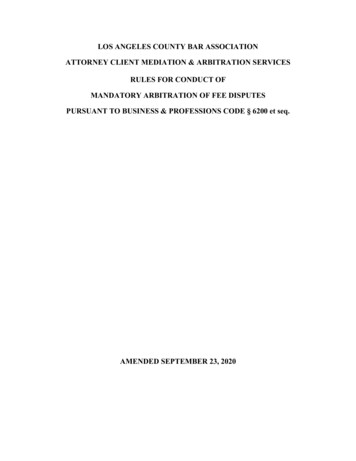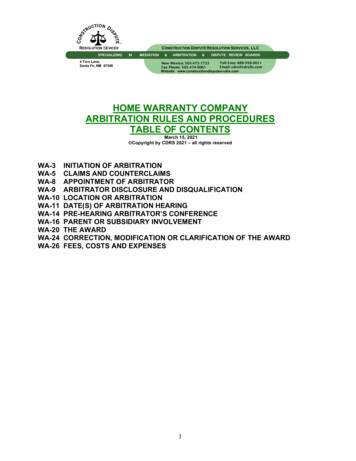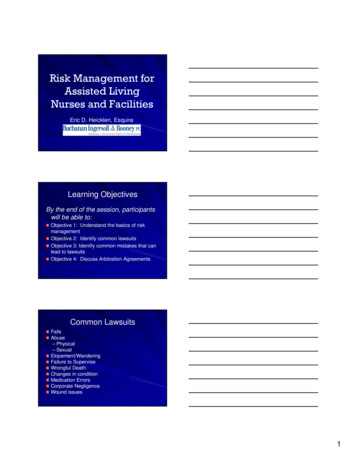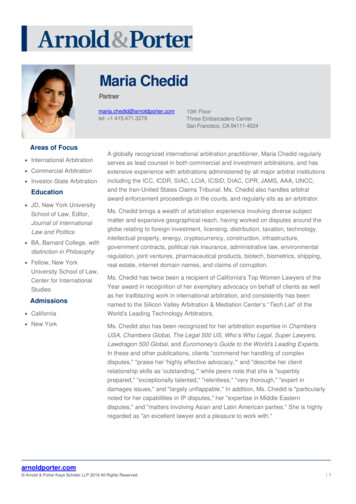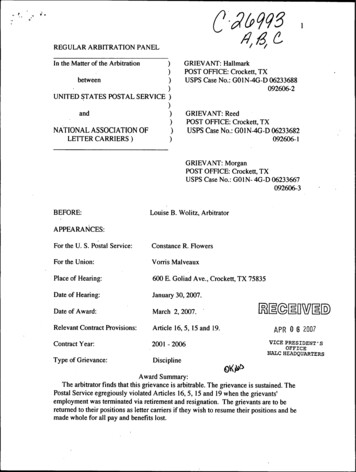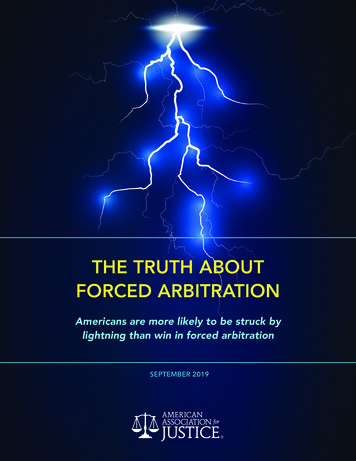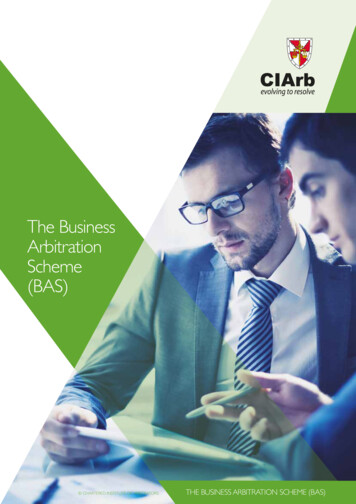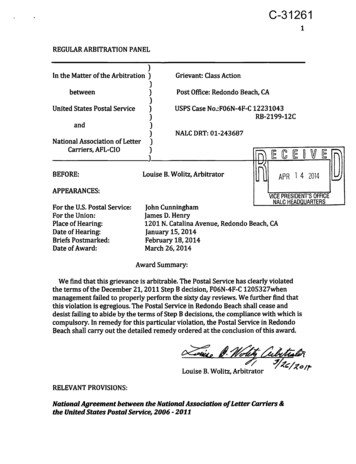
Transcription
C-312611REGULAR ARBITRATION PANEL)In the Matter of the Arbitration ))between))United States Postal Service))and)National Association of LetterCarriers, AFL-CI 0)))Grievant: Class ActionPost Office: Redondo Beach, CAUSPS Case No.:F06N-4F-C 12231043RB-2199-12CNALC DRT: 01-243687--------------------.)BEFORE:rR1APR 1 4 2014l.1lJLouise B. Wolitz, ArbitratorAPPEARANCES:For the U.S. Postal Service:For the Union:Place of Hearing:Date of Hearing:Briefs Postmarked:Date of Award:IE lG IE WI IEVICE PRESIDENT'S OFFICENALC HEADQUARTERSJohn CunninghamJames D. Henry1201 N. Catalina Avenue, Redondo Beach, CAJanuary 15, 2014February 18,2014March 26,2014Award Summary:We find that this grievance is arbitrable. The Postal Service has clearly violatedthe terms of the December 21,2011 Step B decision, F06N-4F-C 1205327whenmanagement failed to properly perform the sixty day reviews. We further find thatthis violation is egregious. The Postal Service in Redondo Beach shall cease anddesist failing to abide by the terms of Step B decisions, the compliance with which iscompulsory. In remedy for this particular violation, the Postal Service in RedondoBeach shall carry out the detailed remedy ordered at the conclusion of this award. 7Louise B. Wolitz, Arbitrator t:/;(D/f"RELEVANT PROVISIONS:National Agreement between the National Association of Letter Carriers &the United States Postal Service, 2006- 2011
2ARTICLESPROHIBITION OF UNILATERAL ACTIONThe Employer will not take any actions affecting wages, hours and other terms andconditions of employment as defined in Section 8(d) of the National Labor RelationsAct which violate the terms of this Agreement or are otherwise inconsistent with itsobligations under law.ARTICLE15GRIEVANTCE-ARBITRA TION PROCEDURESection 2. Grievance Procedure- StepsInformal Step A(a) Any employee who feels aggrieved must discuss the grievance with theemployee's immediate supervisor within fourteen (14) days ofthe date onwhich the employee or the Union first learned or may reasonably have beenexpected to have learned ofits cause. This constitutes the Informal Step A filingdate. The employee, if he or she so desires, may be accompanied andrepresented by the employee's steward or a Union representative. During themeeting the parties are encouraged to jointly review all relevant documents tofacilitate resolution of the dispute. The Union also may initiate a grievance atInformal Step A within 14 days ofthe date the Union first became aware of(orreasonably should have become aware of) the facts giving rise to the grievance.In such case the participation of an individual grievant is not required. AnInformal Step A Union grievance may involve a complaint affecting more thanone employee in the office.Section 3 - Grievance Procedure - GeneralA. The parties expect that good faith observance, by their respectiverepresentatives, of the principles and procedures set forth above will result inresolution ofsubstantially all grievances initiated hereunder at the lowestpossible step and recognize their obligation to achieve that end. At each step of
3the process the parties are required to jointly review the ]oint ContractAdministration Manual GCAM).ARTICLE17REPRESENTATIONSection 3. Rights ofStewardsWhen it is necessary for a steward to leave his/her work area to investigate and adjustgrievances or to investigate a specific problem to determine whether to file agrievance, the steward shall request permission from the immediate supervisor andsuch request shall not be unreasonably denied. In the event the duties require thesteward leave the work area and enter another area within the installation or postoffice, the steward must also receive permission from the supervisor from the otherarea hejshe wishes to enter and such request shall not be unreasonably denied. Thesteward, chiefsteward or other Union representative properly certified in accordancewith Section 2 above may request and shall obtain access through the appropriatesupervisor to review the documents, files and other records necessary for processing agrievance or determining if a grievance exists and shall have the right to interview theaggrieved employee(s), supervisors and witnesses during working hours. Such requestsshall not be unreasonably denied .ARTICLE19HANDBOOKS AND MANUALSThose parts of all handbooks, manuals and published regulations of the Postal Service,that directly relate to wages, hours or working conditions, as they apply to employeescovered by this Agreement, shall contain nothing that conflicts with this Agreement,and shall be continued in effect except that the Employer shall have the right to makechanges that are not inconsistent with this Agreement and that are fair, reasonableand equitable. This includes, but is not limited to the Postal Service Manual and the F21, Timekeeper's Instructions. Notice ofsuch proposed changes that directly relate towages, hours, or working conditions will be furnished to the Union at the national levelat least sixtJ! (60) days prior to issuance. At the request of the Union, the parties shallmeet concerning such changes. If the Union, after the meeting, believes the proposedchanges violate the National Agreement (including this Article), it may then submit theissue to arbitration in accordance with the arbitration procedure within sixty (60)days after receipt of the notice of proposed changes. Copies of those parts of all newhandbooks, manuals and regulations that directly relate to wages, hours or working
4conditions, as they apply to employees covered by this Agreement shall be furnishedthe Union upon issuance.ARTICLE31UNION-MANAGEMENT COOPERATIONSe on lnfonnationThe Employer will make available for inspection by the Union all relevant informationnecessary for collective bargaining or the enforcement administration orinterpretation ofthis Agreement including information necessary to determinewhether to file or to continue the processing of a grievance under this AgreementUpon the request of the Union, the Employer will furnish such information provided,however, that the Employer may require the Union to reimburse the USPS for any costsreasonably incurred in obtaining the information. Requests for information relating topurely local matters should be submitted by the local Union representative to theinstallation head or designee. All other requests for information shall be directed bythe National President of the Union to the Vice President Labor Relations. Nothingherein shall waive any rights the Union may have to obtain information under theNational Labor Relations Act as amended.THE HEARING:The hearing on this matter was held at the Redondo Beach Post Office on January15, 2014. Each party had a full opportunity to present its evidence, witnesses andarguments and to cross examine opposing witnesses. All witnesses were sworn.The Union called witness Barbara Stickler, President, NALC Branch 1100, shopsteward, and DPS coordinator. The Postal Service did not call any witnesses. Theparties entered Jt X 1, National Agreement and JCAM; Jt X 2, Moving Documents;and Jt X 3, FSS Memo M-1643. The parties mutually agreed to postmark briefs byFebruary 14, 2014, later extended to February 18, 2014 by mutual agreement Thebriefs were received timely by the arbitrator. The arbitrator has carefully studiedthe evidence in the Moving Documents, her notes on the witness testimony, and thebriefs and arbitration citations offered by the parties.THE ISSUE:The issue in this case is: Did Management violate the M-39 Handbook via Article19, or compliance with prior Redondo Beach Step B Decision F06N-4F-C 12035327 viaArticle 15, or Article 17, or Article 31, ofthe National Agreement when Management
5failed to did not properly perform (sic) the siey (60) day reviews? Ifso, what is theappropriate remedy?BACKGROUND:In Step B Decision F06N-4F-OC 12035327, the DRT made the following decision:The Dispute Resolution Team has RESOLVED this grievance. A violation hasbeen shown. The following remedy will be applied:*Upon receipt ofthis decision, Management's Formal Step A Representativewill contact the Union's Formal Step A Representative to make arrangementsto conduct a joint review of the FSS adjustments in Redondo Beach.*Prior to the joint review, Management will give the Union theworkhour/workload data for the 60 day period following the implementationof the FSS adjustments.*In accord with the MOURe: FSS Implementation (M-01643), if either parzydetermines the routes in Redondo Beach were not properly adjusted, then theroutes will be adjusted in accordance with the provisions ofthe Handbook M39, or if applicable, a locally agreed upon adjustment formula.The decision notes that the Incident Date giving rise to this grievance isNovember 7, 2011 and the Informal A meeting on this grievance took place onNovember 16, 2011. There was no Formal Step A meeting. The Step B Decision isdated December 21, 2011.The Explanation for the decision says: According to the file, FSS route adjustmentswere implemented in Redondo Beach on September 18, 2011. The subsequent 60 dayreview period ended on November 16,2011. At that time, the Union contactedManagement to initiate the 60 day review specified in the National FSS MOU.Management did not respond to the request The Union also submitted a request forthe workhour/workload data for the 60 day period following the implementation ofthe FSS adjustments. Management did not provide the information.The Union contends that Management has failed to abide by Step B DecisionF06N-4F-C 12035327, failed to conduct a joint review of FSS adjustments with theUnion, failed to provide the Union with information prior to that joint review, andthen failed to provide information and steward time for this instant grievance.The grievance before us here shows an Incident Date of June 15, 2012. TheInformal Step A was initiated on June 15, 2012. The Formal Step A Meeting was heldon June 27, 2012. It was received at Step B originally on July 2, 2012 and sent to anAssisting Team on August 2, 2012. It was decided by the Louisiana/AlbuquerqueDispute Resolution Team and sent to the Sana Ana Dispute Resolution Team fordistribution to the respective parties and closing out in GATS. It was received by thedeciding DRT on August 6, 2012. The Step B decision is dated August 14,2012.
6ARBITRABILITYPosition of the Postal Service:Management argues in its Opening Statement that this grievance is not arbitrablebecause it is not timely filed. Management argues that the Postal Service respondedto the December 21, 2011 Step B decision on March 30, 2012. Postmaster Tracy AJones sent a communication to the Union headed: Redondo Beach 60 day FSSAdjustment Review. The communication Ut X 2, p. 36) says:Management Consideration after 60 days:1) Review 30 days data between October- November skipping Decemberand reviewing 30 day data between january- February Walking allroutes to evaluate street time, time wasting practices and performanceissues.The secondary 60 day review and follow up of data for the month ofFebruary was done and the following was determined:2) Routes current routes for immediate review are: 77009, 77010,77025, 77029, 77038, 78013, 78029, 78033 and 78034. These routesmet the qualifying criteria under M39 Handbook, Section 271g and willbe considered for residential or other delivery relief3) Management will continue conducting 3999's to evaluate street times.The pecking order of these routes will be jointly agreed to.4) The employees reserve the right to envoke their 271 rights under theNational contract provision.The Postal Service argues that this is the notification to the Union ofmanagement's response to the December 21,2011 Step B settlement agreementThe Union could have filed a grievance within 14 days of receiving this notification.The Union did not file a grievance within 14 days. The Union waited ten weeks. TheUnion filed the instant grievance on June 15, 2012. Therefore, this grievance is nottimely.The Postal Service responded to the Union's Opening Statement by arguing thatany argument by the Union that it did not receive the management communicationon or about March 30th is new argument that should not be considered because theUnion has never disputed its receipt of this communication in the file. The PostalService also points out a letter in the file dated June 27, 2012 from management'sFormal Step A representative which stated that the grievance is untimely in itsdenial of the grievance at Formal Step A. Management says:
71. The grievance is Untimely. The actual adjustments were conducted on orabout September 29, 2011 and the review meeting was conducted at theend of February of2011. The union had 14 days from that meeting tofile a grievance but failed to do so.2.Mgmt contends a 60 day review did occur and on March 30, 2012 aletter was sent to the union identifying management considerations movingforward from the adjustment (See attachment pages 2 - 6). In that lettermanagement identifies a process that includes evaluating street timesand time wasting practices. In addition routes are identified to have specialroute counts to further review and evaluate route times. Management contendsthere is a road map to review routes as a result of the 60 day review as outlinedin attachment page #2.Union has not provided management with any documents, or information theyappealed grievance to Formal A nor any facts that substantiate the Union's position.In its brief, the Postal Service argues that management has pointed out correctlyat all previous stages of this grievance that it was not initiated within the time limitsimposed by Article 15.2 (Informal Step A). Management cites Elkouri & Elkouri, HowArbitration Works, (5th Edition, 1997) pp. 276-277, which says: If the agreementdoes contain clear time limits for filing and prosecuting grievances, failure to observethem generally will result in dismissal ofthe grievance if the failure is protested. Thus,the practical effect oflate filing in many instances is that the merits of the dispute arenever decided. Management argues that it has contended without rebuttal that theUnion was informed of the results of Management's 60-day review in the letterdated March 30, 2012 (see above) which was delivered to the Union on or aroundthat date. The Union has not disputed this at any point in the processing of thisgrievance. Rather than review management's results and offer its owndetermination or any challenge to Management's determination, the Union insteadchose to wait approximately ten weeks and then to initiate a grievance claimingnon-compliance with the Step B decision dated December 21, 2011.The testimony of union witness Barbara Stickler that the March 30, 2012 lettercaused the Union to contend that management had not complied with the Step Bsettlement dated December 21, 2011 proves that on or around March 30, 2012, theUnion was aware or should have been aware of the alleged violation. This triggeredthe 14-daytime period within which the Union must file a grievance on the matteror consider their right to do so waived. The Union did not contact Management todispute its determination of the review. It should be inferred from this that theUnion already considered Management to have failed to comply with the prior StepB settlement. The Union would have been within its rights to contend this within 14days, but it did not. The Union's argument of a continuing violation in this case ismeritless. As the Union has admitted to being aware of the alleged violation on oraround March 30,2012 with the Postmaster's notification to the Union of
8Management's actions, to suggest that a continuing violation occurred after thatwould make as much sense as a grievance being filed more than 14 days after anemployee had been issued a removal notice and the Union arguing that theemployee continued to remain in a removed status, so the grievance is timely.The Union has also contended that it requested information to file the instantgrievance and that Management failed to provide it. The Postal Service contends,based on the information request included in the case file, that the Union did notrequest information for this grievance until June 25, 2012. The Union requested"any other relevant information not specifically requested but relied upon by theemployer to support its position copy ofproofofcompliance or a detailed statement ofreasons for failure to comply." The Postal Service contends, based on an emailincluded in the file between NALC representative Barbara Stickler and OperationManager Angelia Volz, documentation was provided to the Union. Ms. Volz stated inthe email that although the documentation was provided to the Union earlier,Management had gathered the documentation. Management informed the Unionthat providing the information again may incur a cost based on Chapter 4 - 6.1 ofthe ASM 353. The Union did not address this email in its contentions.Position of the Union:The Union argues in its Opening Statement that the December 21, 2011 Step Bdecision required the Postal Service to provide information to the Union prior toany review being conducted and required that a joint review be done. The PostalService did not conduct a joint review. The Postal Service did a unilateral review,and not of the entire City. Until a joint review is conducted, and every route in thecity reviewed, the Postal Service is in ongoing violation of the December 21,2011Step B decision. The December 21,2011 Step B decision does not say anythingabout routes being required to meet any Section 271g criteria. It says the PostalService shall conduct adjustments. The Postal Service still has not met the terms ofthe December 21, 2011 Step B decision. The Postal Service is in continuing violationof the December 21,2011 Step B decision because they have not completed the jointreviews for all postal routes. The Postal Service is in continuing violation until thatis done. They did not review all the routes and the reviews that they did were notjoint reviews.Furthermore, the Union argues that the Union did not get Management'scommunication, dated March 30, 2012 Ot. X 2, p. 36) until the Formal A on thisgrievance, which took place on June 27, 2012. The communication was included inthe Postal Service's Formal A arguments and in management's contentions atFormal A. Management has provided no proof that this communication was mailedor received on or around March 30th. Moreover, on the Form 8190, signed by bothparties on June 27, 2012, under Undisputed Facts, it clearly states: This grievance istimely. Ot X 2, p. 12). Management did not strike it out as an Undisputed Fact at theFormal Step A meeting, which took place on June 27,2012. If management disputed
9the timeliness, they would have struck it out at the Formal A. At the Formal A, bothparties reviewed the 8190 and signed itUnion witness Barbara Stickler testified that both parties signed the 8190 Qt. X 2,p. 12) saying they agree with what is written on the form. Line 16 on the form saysunder Undisputed Facts: This grievance is timely. It means that the parties jointlyagreed the grievance was timely. It is not crossed off. This is a continuing violation,day after day. Since it occurs every day, it can be addressed by a grievance at anypoint There was no secondary 60 day review. The FSS Memo does not require thatroutes meet the 271 criteria to be adjusted. Any route is out of adjustment if it is notbetween 7 hours and 50 minutes and 8 hours and 10 minutes. The Postal Servicehad to try to adjust routes to be within this time frame. The Postal Service's letter ofMarch 30 does not indicate that anything was done jointly. It says they will review 9routes. There are 75 to 80 routes in Redondo Beach. Even if they reviewed someroutes, it was not a joint review. If there was not a joint review, they have to do a 6day count The 3999 is essential in determining adjustments. They have to adjust theroute to the carrier. The March 30th letter indicated the adjustments weren't doneyet The December 2011 Step B decision is binding on the City. It is what gave rise tothis instant grievance. It required management to contact the Union. That did nothappen. Ms. Stickler contacted management in mid-March. She reached out This is arepeat violation. She did not receive a 60 day review. She did not receive the workhour/workload report. The March 30th letter said management looked at Octoberand November and January and February. This was not 60 days following theadjustment. It was not joint It did not look at all the routes. The March 30th lettermade it clear that management did not comply with the Step B decision. They hadnot done the 3999's yet The Union could not look at the data because it was notdone yet. The 60 day work hour/work load report starts the process. They thenhave to talk to the carrier to see if the carrier agrees or disagrees. The Union did notreceive the requested information, RB2199-12C. From December 21,2011 throughJune 18, 2012, the Service did not provide the information. Ms. Stickler said that shehas been emailing and talking to them repeatedly requesting the information. The1840 and 1840 R's have not been provided, showing what adjustments have beenmade, block by block. No joint review was ever done. A handful of routes had beencounted, but not the entire installation. Until the information is provided and a jointreview occurs and all the routes are counted, the Service is not in compliance withthe Step B decision. This is an ongoing violation. Routes are still out of adjustmentand the Union has been provided no information, no count and no adjustmentIn its brief, the Union maintains that the grievance is timely for numerousreasons. The Postal Service provided no confirmation as to when or if the unsignedletter from Tracy Jones, which they claim started the 14 day time frame, wasreceived by the Union or when and if they mailed it The file does not contain anydocuments to support a start date for filing a grievance. The Formal A parties actedin accordance with Article 15 and completed the Joint Step A Grievance Form 8190.The process calls for the parties to jointly complete the 8190 and to affix theirsignatures upon review and completion to signify agreement of the content and
10finalization of processing. The parties have the option to mutually agree uponUndisputed Facts in Line 16 of the form. If either party does not mutually agree toan undisputed fact they either don't annotate any item as undisputed in Line 16 orcross out or delete any item not mutually agreed upon as undisputed. Neither ofthese occurred in this case. The Formal A parties in this case mutually agreed uponan Undisputed Fact in Line 16 that: This Grievance is timely. The union maintainsthat the form speaks for itself. The grievance therefore must be declared arbitrableregarding the timeliness.The Union further maintains that the instant case is arbitrable based on acontinuing violation. Even if the Service had provided a firm date of when the unionwas notified, it would only affect the begin date of the remedy sought, as theviolation occurred every day and the start of the 14 day period to file was renewedevery day until the failure to comply on all items and issues was satisfiedcompletely. In this case, had the union waited more than 14 days after the Servicehad provided the information, conducted the requested 6 day route counts on all theassignments, conducted joint reviews and adjusted the routes to as close to 8 hoursas possible, then perhaps the Service could make a prima facie case. However, in theinstant case, the Service did nothing and made no genuine effort to comply with theStep B decision. Therefore, until compliance was completely effected, the violationwas of a continuing nature. The union maintains that this grievance is arbitrable.DECISION ON ARBITRABILITY:We find that this grievance is arbitrable. We agree with the Union that the PostalService clearly took no steps to comply with the December 21, 2011 Step Bsettlement agreement It did not contact the Union to make arrangements toconduct a joint review of the FSS adjustments in Redondo Beach. It did not give theUnion the workhour/workload data for the 60 day period following theimplementation of the FSS adjustments. It did not determine if either partydetermined that the routes were not properly adjusted and it did not adjust theroutes in accordance with the provisions of the Handbook M-39 or a locally agreedupon adjustment formula. That means that every day from the date of the Step Bdecision, December 21, 2011, the Postal Service was violating the settlementagreement Therefore, a timely grievance could be brought on any day until theagreement was complied with. The March 30th letter did nothing to alter this state. Itmade no representation that the Union was contacted to make arrangements toconduct a joint review; it did not give the Union the workhour/workload date forthe 60 day period following the implementation of the adjustments; it did not adjustthe routes in accordance with the provisions of the Handbook M-39. It did not claimto be complying with the December 21,2011 Step B settlement agreement, nor didit offer any evidence that it was complying. Therefore, it was continually in violationof that agreement. It was not in compliance with that agreement on the IncidentDate indicated in this grievance, June 15, 2012. This grievance is timely filed.The parties also agreed that it was timely filed on the Form 8190 as an UndisputedFact.
11THE MERITS:Position of the Union:Union Branch President Barbara Stickler testified that the implementation of FSSallows management to make first adjustments to the routes. Then it requiresmanagement to do a joint review after 60 days with the Union or to do a 6-day countunder the M-39. Ms. Stickler testified that the parties attempted to do a joint reviewin November, which broke down. They tried again in March of 2012. They wereunable to do it The required 6-day count also did not occur.We note that Jt X 3, Memorandum of Understanding, Re: FSS Implementation, (M01643)says:The United States Postal Service and National Association of Letter Carriers,AFL-CIO mutually recognize that the delivery point sequencing offlat mail willchange the delivery environment, ultimately producing better service for postalcustomers. The Postal Service experienced significant benefits in 1993 byautomating the processing and sequencing ofletter mail, as the parties workedtogether to implement that technology. In the interest of working jointly on thistechnology the parties agree to the following:1. Once FSS is fully implemented in a delivery unit, management will determinethe methods to estimate impact in a delivery unit and make route adjustmentsaccordingly.2. Sixt;y days after implementing route adjustments for FSS, the local partieswill review the adjustments to ensure that routes are as near 8 hours aspossible. This sixty day period will not count toward the special routeinspection process (Section 271, Handbook M-39; Section 918, Handbook M41). If either party determines that the route(s) is not properly adjusted, thenthe route(s) will be adjusted in accordance with the provisions ofHandbook M-39 or, if applicable, a locally agreed upon adjustment formula.The terms ofthis Memorandum are effective immediately and continuethrough all phases ofFlats Sequencing System (FSS) Implementation.Ms. Stickler also testified that the Union submitted requests for information onJune 25, 2012 citing a failure to comply with RB-4211-11C and conduct a proper 60day review/adjustment The Union requested any other relevant information notrequested but relied upon by the employer to support its position and a copy of proofof compliance or detailed statement on reasons for failure to comply Qt. X 2, p. 27).The Union also faxed the request on June 25, 2012 Ot X 2, p. 28). The Union wasnotified by the Postal Service that the request was not received until July 2, 2012.The notification said that the envelope had a meter date of 6/25/12. The notice
12further said that the request will be processed today with a 48 hour turnaround. Ms.Stickler said that she had been emailing and talking to the Postal Service from Marchthrough May requesting the information. The Union did not receive the requestedinformation. Between December 21,2011 and June 18,2012, the Postal Service hadnot provided the information. It also did not provide the 1840 or 1840R. No jointreview was ever done. A handful of routes had been counted, but not the entireinstallation. The unilateral adjustments weren't even for the immediate sixty (60)day period following the FSS implementation. She requested counts from theDistrict Manager and from Angelia Volz. They were never done and they are not onthe list for 2014. Until the information is provided and a joint review occurs and allthe routes are counted, the Service is not in compliance with the December 21,2011Step B decision. The routes are still out of adjustment (see Jt. X 2, pp. 37- 40). Theforms on pages 37 40 are not the in the standard format for a DOIS report, were notprovided prior to the Formal A meeting, and are not what the Union was requesting.There is no indication what time frame these numbers cover. The Union was lookingfor the 60 day work hour/workload DOIS report The DOIS report estimates thecarrier's day street time and actual time based on clock rings. However, even theseforms, management's own document, shows that the routes are overwhelmingly outof adjustment. Employees have been working 10 hours a day. The process brokedown because management did not want to make adjustments.Ms. Stickler said that Redondo Beach routinely fails to comply with settlementagreements and denies information to the Union. Pages 54 65 are all grievances onfailure to comply with settlement agreements and failure to pay carrier
James D. Henry APR 1 4 2014 l.1lJ VICE PRESIDENT'S OFFICE NALC HEADQUARTERS 1201 N. Catalina Avenue, Redondo Beach, CA January 15, 2014 February 18,2014 March 26,2014 Award Summary: We find that this grievance is arbitrable. The Postal Service has clearly violated the terms of the December 21,2011 Step B decision, F06N-4F-C 1205327when management failed to properly perform the sixty day .
